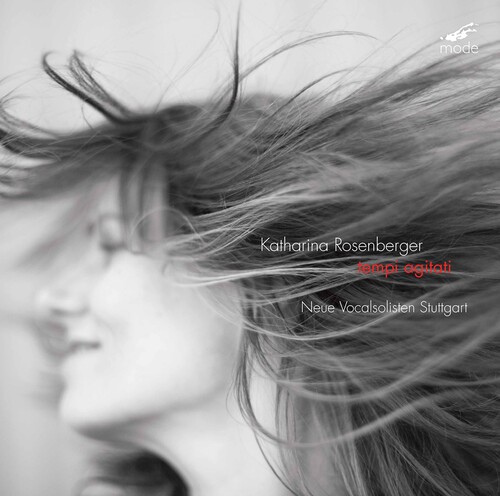Show results for
Deals
- 4K Ultra HD Sale
- Action Sale
- Alternative Rock Sale
- Anime sale
- Award Winners Sale
- Bear Family Sale
- Blu ray Sale
- Blues on Sale
- British Sale
- Classical Music Sale
- Comedy Music Sale
- Comedy Sale
- Country Sale
- Criterion Sale
- Electronic Music sale
- Fantasy Film and TV
- Folk Music Sale
- Hard Rock and Metal Sale
- Horror Sci fi Sale
- Jazz Sale
- Kids and Family Music sale
- Kids and Family Sale
- Metal Sale
- Music Video Sale
- Musicals on Sale
- Mystery Sale
- Naxos Label Sale
- Olive Films on Sale
- Page to Screen Sale
- Paramount Sale
- Pop and Power Pop
- Rap and Hip Hop Sale
- Reggae Sale
- Rock and Pop Sale
- Rock Legends
- Soul Music Sale
- TV Sale
- TV Sale
- Vinyl on Sale
- War Films and Westerns on Sale

Tempi Agitati
- Format: CD
- Release Date: 4/22/2022

Tempi Agitati
- Format: CD
- Release Date: 4/22/2022
- Composers: Katharina Rosenberger
- Label: Mode Records
- UPC: 764593033424
- Item #: 2478689X
- Genre: Classical
- Release Date: 4/22/2022

Product Notes
On April 6, 1327, a 22-year-old Italian poet named Francesco Petrarca caught a glimpse of a young woman, Laura, in a church in Avignon. He later reported that "living sparks issued from two lovely eyes". Those sparks enflamed Petrarch such that he spent the rest of his illustrious career coming to terms with them. In the 16th century, madrigals were developed by Adrian Willaert and Cipriano de Rore, which took Petrarch's agonized images as justification for violating the rules that had guided musicians since before the beginnings of notated music. Those living sparks have leapt ahead seven more centuries to inspire Katharina Rosenberger. Her tempi agitati embeds Petrarch's texts (especially fragments from his "Ascent of Mount Ventoso") and settings of sonnets by Willaert and Rore within her own responses to those materials. In live performance, Rosenberger works together with stage-director Ludger Engels to distribute members of the ensemble, Neue Vocalsolisten, around the sound space; they dart around throughout the site, thereby embodying Petrarch's "vive faville." While a sound recording lacks the visual dimension crucial to Rosenberger's concept, it allows the listener to attend much more closely to her rich tapestry of sonorities as she puts Petrarch's 14th-century poetry and 16th-century madrigals into dialogue with her extended vocal techniques. Sometimes the singers coalesce into whole polyphonic samples before returning to the extended vocal techniques from which they had emerged. Sometimes, finally, the madrigal itself appears, now intact. Rosenberger thereby simulates Petrarch's struggle to put into coherent form his reactions to Laura's glance. Those living sparks have indeed inflamed thousands: Laura's glance goaded Petrarch to the heights of formal perfection in his sonnets, and it led the madrigalists to imagine tonal worlds far beyond the stylistic precepts they had inherited.

